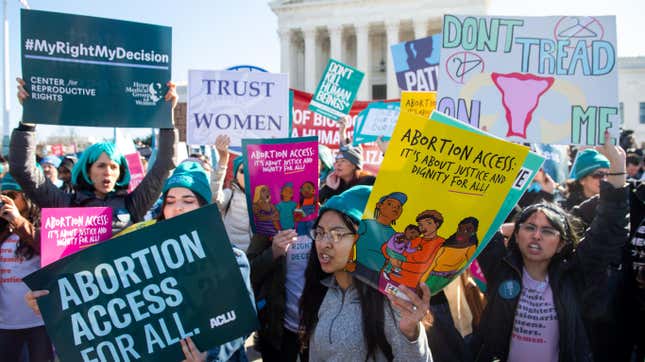Supreme Court Strikes Down Restrictive Louisiana Abortion Law With Nationwide Implications
JusticePolitics

The United States Supreme Court reversed a restrictive Louisiana abortion law Monday that would force all but one abortion provider in the state to close its doors, and which would impact reproductive laws across the nation.
In a 5-4 decision, the court ruled that the Louisiana law, which would require abortion providers to have admitting privileges at nearby hospitals, does not offer any significant health benefit. Instead, as Justice Stephen Breyer noted in the decision, the law would “continue to make it impossible for abortion providers to obtain conforming privileges for reasons that have nothing to do with the State’s asserted interests in promoting women’s health and safety.” This, wrote Breyer, “places a substantial obstacle in the path of women seeking an abortion,” which the court concluded was an undue burden and therefore unconstitutional.
The case—June Medical Services v. Russo—is virtually identical to the Whole Woman’s Health v. Hellerstedt, the 2016 landmark Supreme Court case involving a series of restrictive abortion laws in Texas. In a 5-3 decision, the court ruled that the Texas laws placed an undue burden on those seeking an abortion in the state. But while Chief Justice John Roberts was a dissenting vote in the Whole Woman’s Health decision, he was the fifth and final deciding vote in the Louisiana decision, citing precedent:
“Today’s case is a challenge from several abortion clinics and providers to a Lousiana law nearly identical to the Texas law struck down four years ago in Whole Woman’s Health… The legal doctrine of stare decisis requires us, absent special circumstances, to treat the cases alike. The Louisiana law imposes a burden on access to abortion just as severe as that imposed by the Texas law, for the same reasons. Therefore Lousiana’s law cannot stand under our precedents.”
Though the decision is a victory for abortion advocates across the country, it doesn’t feel like the end of the road. In a press release, Planned Parenthood said, “Sixteen other cases on abortion access are still one step away from the Supreme Court—and any one of them opens the door to restrict or nullify Roe v. Wade altogether.” In a statement, Nancy Northup, president and CEO of the Center for Reproductive Rights, said that Monday’s ruling “will not stop those hell-bent on banning abortion” and that legislation is the only way to put an end to the madness. Emphasis ours:
…for decades, opponents of reproductive rights have relentlessly sought to deny the promise of Roe v. Wade with an avalanche of laws targeting providers, clinics, and patients. These laws disproportionately impact communities of color, young people, rural communities, and people living in poverty.
[…]
We will be back in court tomorrow and will continue to fight state by state, law by law to protect our constitutional right to abortion. But we shouldn’t have to keep playing whack-a-mole. It’s time for Congress to pass The Women’s Health Protection Act, a federal bill that would ensure the promise of Roe v. Wade is realized in every state for every person.
A tougher push for legislation is undoubtedly the next step forward, but with a Congress that can’t even agree to offer more financial benefits to Americans during an economy busting pandemic, the path forward is sure to be a rained-on marathon, not a sprint.